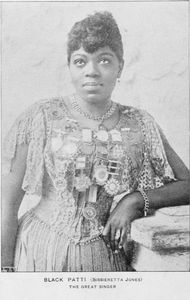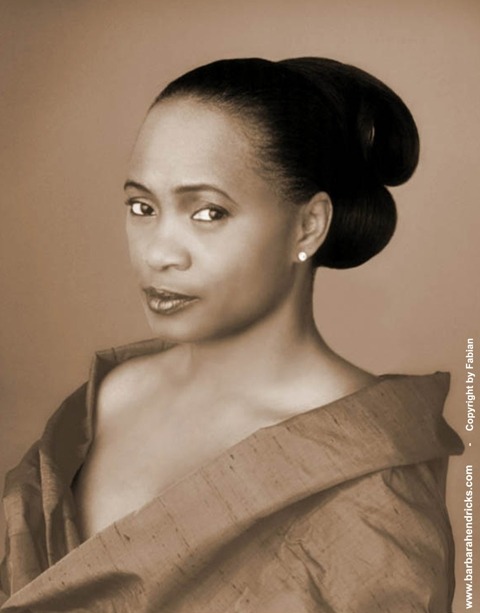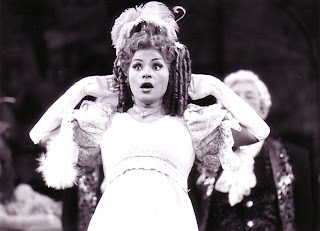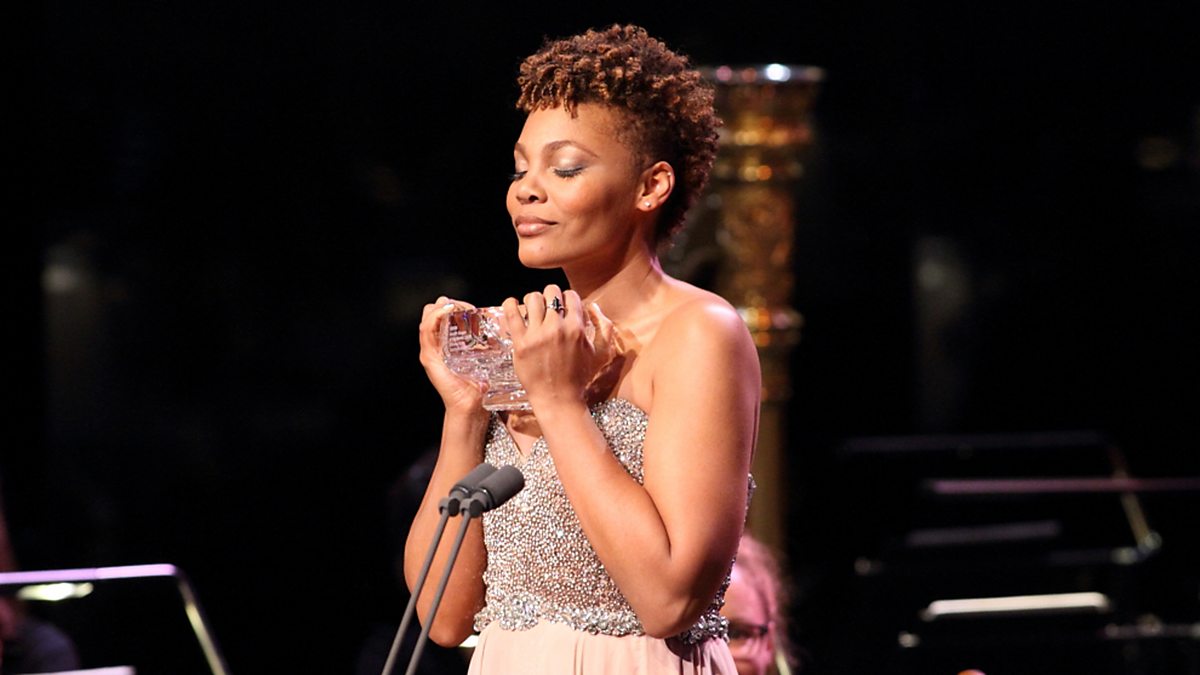African American Opera Divas and Opera Divas of African Descent - Sung and Unsung
Leontyne Price, Soprano
Leontyne Price best known for her Verdi roles, and above all the title role of Aida. She rose to international fame in the 1950s and 60s, and became the first black "superstar" at the once-segregated Metroplitan Opera. For almost 40 years, she was one of America's most beloved and widely recorded sopranos. Price was a leading interpreter of the lirico spinto (Italian for "pushed lyric", or middleweight) roles of Verdi and Puccini, as well as of roles in several operas by Mozart. The voice is noted for its brilliant upper register, the smoky huskiness in the middle and lower registers (sounding almost like a contralto), its smooth "legato" phrasing, and wide dynamic range. She herself called her singing "soul in opera."
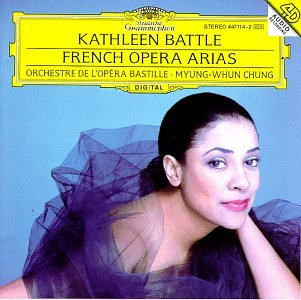
Kathleen Battle, Coloratura soprano
Kathleen Battle is a legendary diva who had a famous falling out with the Metropolitan Opera. Ms. Battle enjoyed an illustrous career as darling black diva at the Metropolitan Opera from 1984-1994, peaking in 1993. She was reknown for her excellent portrayal of Zerbinetta in Strauss' Ariadne auf Naxos, and for her Mozart soubrette roles. She won 8 grammy's for her opera and recital recordings, six honorary doctorates and in 1999 was inducted into the NAACP Image Hall of Fame.
Marian Anderson, Contralto
Marian Anderson was an African-American contralto and one of the most celebrated singers of the twentieth century. An inspiration to singers everywhere, music critic Alan Blyth said "Her voice was a rich, vibrant contralto of intrinsic beauty." A classical music pioneer and Opera Singer, she was a contralto known for her wide-ranging repertory of art songs, opera arias, and spirituals. On Easter Sunday in 1939, more than 75,000 people come to the Lincoln Memorial in Washington, D.C., to hear famed African-American contralto Marian Anderson give a free open-air concert. Anderson had been scheduled to sing at Washington's Constitution Hall, but the Daughters of the American Revolution, a political organization that helped manage the concert hall, denied her the right to perform because of her race. The first lady, Eleanor Roosevelt, resigned her membership from the organization in protest, and Anderson's alternate performance at the Lincoln Memorial served greatly to raise awareness of the problem of racial discrimination in America. The only African American opera singer to have her own US Postal Service stamp.

Jessye Norman, Dramatic Soprano
Her performance resulted in numerous job offers. She went on to tour through the 1970s. By the 1980s her roles in Aïda and Les Troyen had made her one of the most popular and highest paid opera singers worldwide. In 1990, Javier Perez de Cuellar named her honorary ambassador to the United Nations. President Barack Obama presents the 2009 National Medal of Arts to Jessye Norman, Thursday, Feb. 25, 2010, The Jessye Norman School of the Arts was named for her in her hometown.

Mattiwilda Dobbs, Coloratura Soprano
First black woman to sing at the Metropolitan Opera before Leontyne. Known for her Sophie in Der Rosenkavalier. The Atlanta native was the first African American to sing at La Scala in Milan, Italy, and the first black woman to be offered a long-term contract by the Metropolitan Opera Company in New York.
Lillian Evans Evanti, Coloratura
A lyric soprano, she was the first African-American to sing opera with an organized company in Europe. Evanti studied and graduated from Howard University School of Music in 1917. Madame Evanti left America, and conquered Europe with a premiere in Delibes’ opera Lakme, in Nice, France, in 1925. She was honored at the Franklin Roosevelt White House in 1934 and won critical acclaim for her role as Violetta in the National Negro Opera Company's production of Verdi's La Traviata in 1943.
Mme. Sissieretta Jones
The first black opera Diva Mme. Sissieretta Jones was really a
remarkable woman – an artist whom biographers cannot overlook. Sissieretta, known as the “Black Patti,” (after the renowned Adelina Patti) received metals and awards for singing and wore them as badges on her gowns at her concerts. In June 1892, Jones became the first African-American to sing at Carnegie Hall. The New York Echo wrote of her performance at the Music Hall: "If
Mme Jones is not the equal of Adelina Patti, she at least can come
nearer it than anything the American public has heard. Her notes are as
clear as a mockingbird's and her annunciation perfect." Sissieretta was born in Portsmouth, Virginia, in 1868. She received vocal training in Providence and Boston before starting her professional singing career. Her fame grew until her career took a new twist
in 1896 when she became the star of the Black Patti Troubadours, a
40-member troupe of black entertainers who traveled the country
performing stage shows that included comedy sketches, dancing, music,
and variety acts. Sissieretta sang operatic and concert selections in
the third part of the show. The troupe, later called the Black Patti
Musical Comedy Company, traveled throughout the United States for 20
years. Sissieretta retired from the stage in 1915 and returned to
Providence, where she spent the remainder of her life. She died in 1933.
 |
Reri Grist, Coloratura
Reri Grist is an American coloratura soprano, precursor to Kathleen Battle, and one of the pioneer black singers to enjoy a major international career in opera. Her official operatic debut took place at the Santa Fe Opera in 1959, as Adele in Johann Strauss's Die Fledermaus, followed by Blondchen in Mozart's The Abduction from the Seraglio. Shortly after she was invited to the opera of Cologne to sing the Queen of the Night in Mozart's The Magic Flute, which marked her European debut in 1960. She became a regular performer at Zurich Opera where she sang in many light coloratura roles, such as Sophie in Der Rosenkavalier and Zerbinetta in Ariadne auf Naxos. After her success in Zurich, she found herself much in demand, making her debut at the Royal Opera House and the Glyndebourne Festival, in 1962, followed by the Vienna State Opera and the San Francisco Opera, in 1963, the Salzburg Festival, in 1965, where she sang frequently the Mozart soubrette roles, such as Susanna in Le nozze di Figaro, Zerlina in Don Giovanni, and Despina in Cosi fan tutte. Her Metropolitan Opera debut took place on February 25, 1966, as Rosina in Il barbiere di Siviglia. Her other roles at the Met included, Adina in L'elisir d'amore, Norina in Don Pasquale, Gilda in Rigoletto, Olympia in Les contes d'Hoffmann, Oscar in Un ballo in maschera, as well as Sophie in Der Rosenkavalier and Zerbinetta in Ariadne auf Naxos. Grist was also active teaching at the Munich Hochschule, and giving numerous masterclasses in centers such as Zurich, Ravinia, Bloomington, San Francisco. She currently lives in Hamburg with her husband, noted musicologist, Ulf Thomson. Reri Grist possessed a sweet and agile voice, and a most enchanting presence on stage. She made relatively few recordings, but can be heard as Oscar in two recordings of Un ballo in maschera, the first in 1966, opposite Leontyne Price, and the second in 1975, opposite Martina Arroyo, two African-American sopranos like Grist.
Dorothy Maynor, Lyric Soprano
Dorothy Maynor, a Great Singer Opera Missed. Known for her exquisite rendition of "Depuis le jour" was said to sing it more beautifully than anyone on earth. "The voice itself was rare and special enough for history to have been more generous. It was marked by warmth and soul-stirring richness, with bell-like clarity in the upper range, and enhanced by a rare ability to float out a weightless mezza voce. Maynor exploited the device so well, especially in "Depuis le jour" from Louise, that her renderings of the aria still set the standard by which others are judged." Because of her race, she settled to teach at Harlem school of the arts, where she was a founding member.
Barbara Hendricks, Soprano
Since her 1974 New York Town Hall debut, Barbara Hendricks has been acclaimed as one of the leading and most active recitalists of her generation and in addition to her vast repertoire of German Lieder she is also known as a leading interpreter and staunch promoter of French, American and Scandanavian music. Since 1987, Barbara Hendricks has worked actively with the United Nations High Commission for Refugees (UNHCR) as its Goodwill Ambassador, visiting refugee camps throughout the world.

Shirley Verrett, Mezzo and Soprano
Shirley Verrett was an American operatic mezzo-soprano who successfully transitioned into soprano roles i.e. soprano sfogato. Ms. Verrett enjoyed great fame from the late 1960s through the 1990s, particularly well-known for singing the works of Verdi and Donizetti.

Grace Bumbrey, Mezzo soprano
Miss Bumbry made her operatic debut in 1960 with the Paris Opera Company as Amneris in Verdi's "Aïda." In 1961, she became the first Black woman to sing the role of Venus in Richard Wagner's "Tannhäuser" at the Wagner Bayreuth Festival. She made her United States debut in the same role at the Chicago Lyric Opera in 1963. Other roles include Verdi's "MacBeth," Strauss's "Salome," and Gershwin's "Porgy and Bess." Awards: Kennedy Center Honors
Betty Allen, Mezzo soprano
Betty Allen made her New York City Opera debut in 1954 as Queenie in Showboat. She made her New York recital debut at Town Hall in 1958, followed by appearances in London, The Hague, Oslo, Montreal, and Berlin. In 1964 she made her formal opera debut at the Teatro Colon in Buenos Aires, Argentina. She made her North American debut with San Francisco Opera in 1966, the Canadian Opera and Bellas Artes in Mexico City in 1971, New York City Opera debut in 1973, Metropolitan Opera in New York in February 1973 (as Commère in Four Saints in Three Acts during the company's visit to Manhattan Forum), and Metropolitan Opera's mini-Met in 1974. She sang at the New York City Opera from 1973 to 1975. Betty Alen also toured as a concert singer, and since 1967 has made regular appearances at the Marlboro and Casals Music Festivals, and has also appeared with the Santa Fe Opera and Santa Fe Chamber Music Festival, and at Ravinia, Saratoga, Tanglewood, and the Cincinnati May and Caramoor music festivals. She taught at Manhattan School of Music and Harlem School of the Arts.
 Adele Addison, Soprano
Adele Addison, Soprano
Adele Addison was an acclaimed figure in opera in the 1950s and 1960s. In 1952, her debut performance at Town Hall in New York was met with excellent, enthusiastic reviews. "The recital season reached a high point last night," one critic wrote, "when Adele Addison, soprano from Springfield, Massachusetts, made her debut in Town Hall." Addison's singing voice was complemented by her performance style, which was rich with emotion and intellectual depth. She is best remembered today as the singing voice for Bess (played by Dorothy Dandridge) in the 1959 movie Porgy and Bess. Recorded Twelve Poems by Emily Dickenson at Carnegie Hall with the composer Aaron Copland at the piano in 1949-50. She taught in the voice department at Manhattan School of Music
Ms Arroyo is known for her interpretations of Verdi, Puccini, Strauss and Mozart. Ms. Arroyo has had the honor of three opening night performances at the Metropolitan Opera, two of them in consecutive seasons. At ease with contemporary music, she has premiered works of William Bolcom and Carlo Franci and was chosen to present the world premiere of Samuel Barber's Andromache's Farewell as well as Karlheinz Stockhausen's Momente. She later recorded both pieces and performed them throughout the United States and Europe. Ms. Arroyo has made more than 50 recordings of major operas and orchestral works with such conductors as Leonard Bernstein, Karl Böhm, Rafael Kubelik, Zubin Mehta, Thomas Schippers, Ricardo Muti, Claudio Abbado, James Levine and Colin Davis. Currently coaches singers in NYC and has her own opera company for young singers
 Leona Mitchell, Soprano
Leona Mitchell, Soprano Beautiful voiced and lyric became the new black diva in the 80s after Leontyne's retirement. After starting her family she chose not to come back to the stage. She has a boulevard named after her, in her hometown of Detroit. Ms. Mitchell debuted with the San Francisco Spring Opera Theater in 1972 and received an Opera America grant, which allowed her to study with Ernest St. John Metz in Los Angeles. On December 15, 1975, she made her Metropolitan Opera debut as Micaela in Bizet's Carmen, the same role she had sung at her debut. This marked the beginning of her many performances in opera houses all over the world, including Geneva, Paris, Madrid, and Sydney. Mitchell performed for eighteen consecutive seasons at the Metropolitan, a testament to her voice and professionalism.
Carmen Balthrop has an astonishing range of repertoire from Baroque opera to contemporary song literature. She has appeared with most of the major opera companies in North America including The Metropolitan, San Francisco and Houston, as well as European opera houses including Venice(Teatro La Fenice) and Berlin (Teatro des Westens). Performing The Doll in Tales of Hoffman
Harolyn Blackwell, Lyric coloratura soprano
Ms. Blackwell's sudden elevation from understudy to star in the production of Donizetti's Daughter of the Regiment when she took over the title role from Kathleen Battle on Feb. 26. Ms. Blackwell, was asked to sing all seven performances, including the broadcast on Feb. 19. The role she's most famous for was the pants role Oscar to Luciano Pavorotti's Renato in Un Ballo in Mascera televised on PBS. After that, she moved to an exotic island and continued to record new music from her home recording studio.
Marvis Martin, Lyric Soprano
Once hailed as the next Leona Mitchell, Marvis Martin had a beautiful creamy lyric soprano voice. She sang 2-3 seasons at the met as Ilia to Carol Vanness' stunning Electra in Mozart's lesser known opera Idomeneo at the Metropolitan in 1985. She moved to her home state of Florida to start a family and has recently moved back to NYC with the Met.
Marquita Lister toured the world as Bess and was televised in the televised production with New York City Opera. She continued to tour singing Bess, Aida, and Tosca and many other soprano roles and spent years at Dresden Semper Oper. Recent appearances as Solome in Richard Strauss' opera at the Boston Lyric Opera.
Michelle Crider, Dramatic Soprano
Michelle Crider is an operatic superstar and a household name. She continues to sing primarily and the Deuche Oper Berlin and other German houses and sung several seasons at the Met.
Denyce Graves, Mezzo soprano
After completing the Houston Grand Opera Studio, Ms. Graves embarked upon a worldwide career. She appeared on 60 Minutes and made her Metropolitan Opera debut in 1995 to excellent reviews as Carmen. She later incorporated Delilah, Dorabella, the Dragon, Le Vestale, Ducinee and Baba the Turk to her repertoire. She is currently on the staff of Peabody Conservatory.
Angela M. Brown, Soprano
"At Last an Aida - NYTimes"
Her highly successful Metropolitan Opera debut in 2004 sparked a media excitement with reviews from The New York Times: "At last an Aida," the Associated Press: "she combines a potent, dusky lower register with a striking ability to spin out soft high notes of shimmering beauty. There's no doubt her voice is powerful enough for Verdi," CBS Evening News: "the future of opera has arrived," and features on the front page of The New York Times and in Oprah Magazine, Essence Magazine, Ebony Magazine, Classical Singer, Reader's Digest, and Psychology Today.
Tichina Vaughn, Mezzo Soprano
The American
mezzo-soprano made her North American Debut as Azucena at Sacremento
Opera. Tichina Vaughn began her operatic career as a member of the
Young Artist Development Program at the Metropolitan Opera after
completing her studies at the University of North Carolina School of the
Arts. She made her debut on the Met stage in Porgy and Bess and her
European debut at the Stuttgart State Theater as Dame Quickly in
Falstaff and as Venus in Tannhäuser. From 1998 till 2006 Tichina Vaughn
was a celebrated member of the ensemble at the Stuttgart State Theater
where the Cultural Ministry Baden-Württemberg awarded her the title of
Kammersängerin.
Indra Thomas, Soprano
The American soprano Indra Thomas has been acclaimed as the next great Verdi soprano. She made her professional debut as soprano soloist in Verdi's Requiem with the New York Choral Society in Carnegie Hall, with the Baltimore Symphony, the National Symphony, the Utah Symphony, and at the Grand Teton Festival. Other orchestral engagements have included Stabat Mater , Mozart's Requiem, Mahler's Symphony No. 8, and Beethoven's Ninth Symphony.
Morineke Fadayomi, Soprano
Rich voiced dramatic. Born in London; raised in London, Africa and Switzerland. Extensive career in Europe and specifically Deutsche Oper am Rhine.
Engagements from the past few seasons include the title roles of Tosca and Aida for the Seattle Opera, Aida for the Portland Opera, Tosca for the Connecticut Opera, Lyric Opera of Kansas City, and Arizona Opera. In 2010 and beyond, she returns to the Seattle Opera as Desdemona in Otello and Leonora in Il Trovatore, performs Santuzza in Cavalleria Rusticana at Opera Lyra Ottawa. Additional recent operatic engagements include Tosca in her debuts with the Palm Beach Opera, Minnesota Opera, Michigan Opera Theatre, Boston Lyric Opera and Opera Carolina; Aida at the Cincinnati Opera, Connecticut Opera, and Opera Delaware; Aida with the Michigan Opera Theater; Santuzza in Cavalleria Rusticana at Opera Theatre of St. Louis; Aida, her role debut as Mimi in La Bohème with the Opera Company of North Carolina; and her role debut as Leonora in Il Trovatore in Hartford, Connecticut. Additional performances include Serena in Porgy and Bess for the Hollywood Bowl, the Lyric Opera of Chicago and on tour in London, Edinburgh, and Cardiff with the Cape Town Opera, the Washington National Opera, the Orlando Philharmonic, and at Opera Company of Philadelphia.
As a premiere interpreter of Bess, she has sung the role with Los Angeles Opera, Dallas Opera, Washington National Opera, the Opera Comique in Paris, Théâtre de Caen, Grand Théâtre in Luxembourg, Accademia Nazionale di Santa Cecilia in Rome, the Teatro Lirio in Cagliari, the Granada Festival, Staatsoper Hannover, Opera Frankfurt, Deutsches Theater München, Koninklijk Theater Carré in Amsterdam, Congress Centrum Hamburg, and at the Teatro Lirico Giuseppe Verdi in Trieste. More recent essays as Madama Butterfly to wonderful reviews.
Laquita Mitchell, praised for her compelling portrayal as Bess at the San Francisco Opera, Lyric Opera of Chicago, Atlanta Opera and New Jersey State Opera and recently released the first live recording of The Gershwins' Porgy and Bess on DVD with Eric Owens as Porgy.
Janinah Burnett, Soprano
Janinah Burnett is famous for her performances as Mimi in Baz Luhrman’s adaptation of
Puccini’s La Bohème. Ms. Burnett received tremendous acclaim winning the
“Ovation Award” with a record 82 consecutive sold-out shows.She currently is on the Met roster.
Soprano from Chicago, graduate of AVA, made her Met Debut recently as Musetta. Repertory: Liù and Turandot. She continues to sing in Berlin, Melbourne and Sydney among the many opera houses worldwide.
Pretty Yende, Soprano
Pretty Yende made her Met debut as Countess Adèle in Rossini’s Le Comte Ory, replacing Nino Machaidze, who was ill. She is currently sought after for her beautiful high notes and her brilliant performances in the Bel Canto repertoire. She may possibly be the youngest soprano on this list. Pretty Yende is Native of South Africa.
Pretty Yende made her Met debut as Countess Adèle in Rossini’s Le Comte Ory, replacing Nino Machaidze, who was ill. She is currently sought after for her beautiful high notes and her brilliant performances in the Bel Canto repertoire. She may possibly be the youngest soprano on this list. Pretty Yende is Native of South Africa.
Angel Blue, Soprano
Angel Blue made her San Francisco Opera debut in the role of Clara in the opera Porgy and Bess. Angel Blue is the 2nd prize winner and the 1st prize Zarzuela winner of the World Opera Competition, "Operalia." While at Los Angeles Opera she has performed the roles of Suzy in La Rondine, Suor Osmina in Suor Angelica, Musetta in La Boheme, and Micaela in Carmen.

Talise Trevigne, Soprano
A graduate of Manhattan School of Music. Talise Trevigne created the role of Pip in Moby Dick by James Haggle,
a role specially written for her and which she inaugurated at the world
premiere of the piece at Dallas Opera and has since sung in San
Francisco and San Diego.
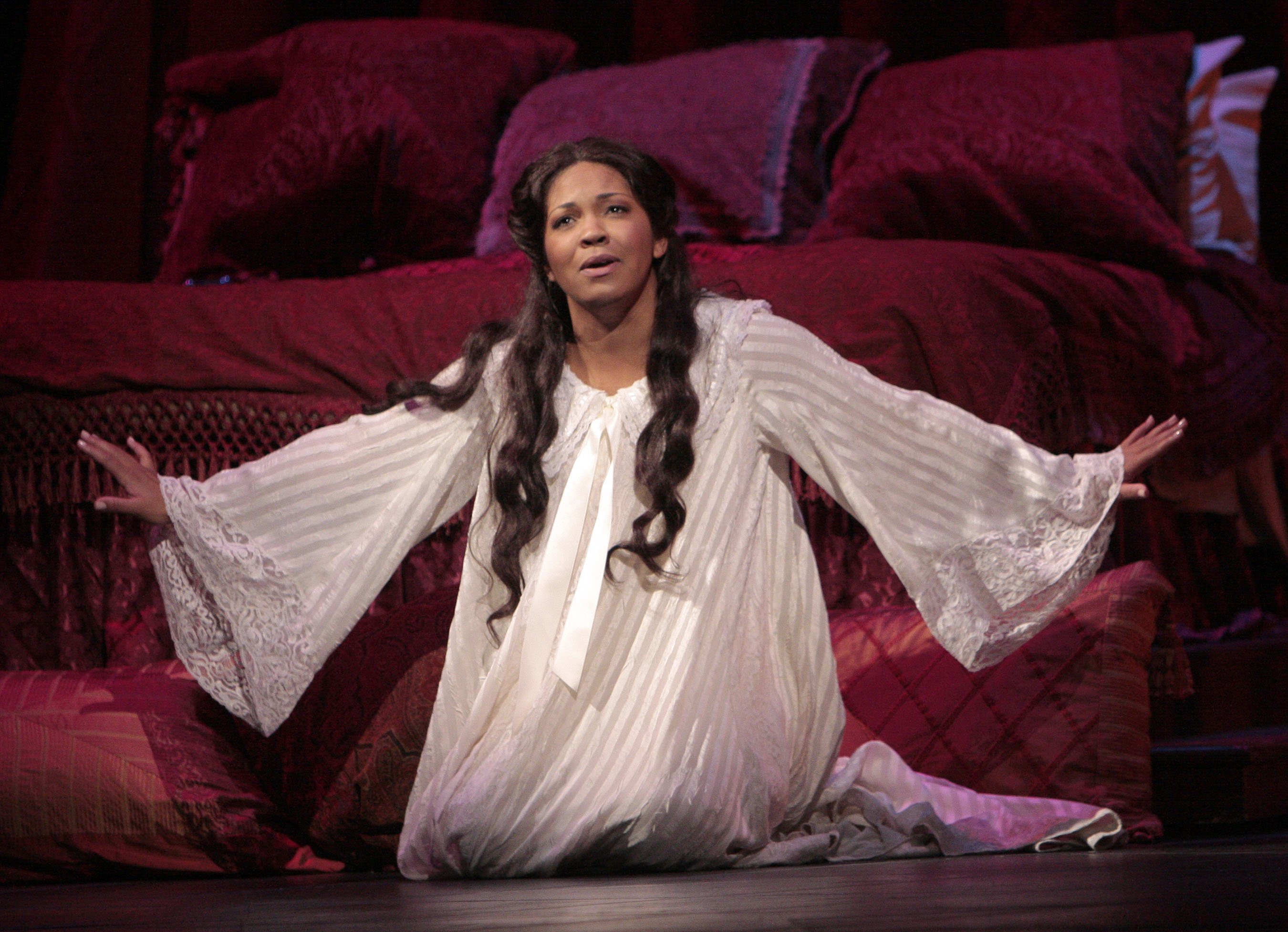
Janai Brugger, Soprano
Janai Brugger studied with the late Shirley Verrett at the University of Michigan and made her Metropolitan Opera debut as Liu in Turandot in 2011-12. She was a winner of the Metropolitan Opera National Council Auditions in 2012.
 Kristin Lewis, Soprano
Kristin Lewis, Soprano
A lyrico-spinto soprano lauded for her interpretations of Verdi
heroines, is a native of Little Rock, Arkansas/USA. Ms. Lewis began her
vocal studies at the University of Central Arkansas under the guidance
of Dr. Martha Antolik. After receiving her Bachelor of Arts degree, she
continued with her Master of Music studies at the University of
Tennessee with Ms. Kay Paschal and Mr. Andrew Wentzel. Her postgraduate
instruction was led by Dr. Jonathan Retzlaff until her move to Vienna,
Austria, where she currently resides. She is now under the tutelage of
Ms. Carol Byers.
Nicole Cabell, Soprano
Best known as the 2005 winner of the BBC Cardiff Singer of the World Competition, Decca recording artist Nicole Cabell was born in Panorama City, California. Her signature roles comprise of Violetta, Juliette, and Mimi among others.
J’nai Bridges, Mezzo soprano
Rising star American mezzo-soprano J’nai Bridges is known for her rich,
emotive sound, capable of deep smoky notes or delicate trills, dramatic
depth and strong interpretive skills. A member of the Lyric Opera of
Chicago's prestigious Patrick G.and Shirley W. Ryan Opera Center, she
has been praised by The Chicago Tribune for her "alluring dusky voice."
Lauren Michelle, Soprano
Up and coming soprano Lauren Michelle was the American
representative in the 2015 BBC Cardiff Singer of the World competition. She makes her Washington National Opera debut singing the role of Irina in the company premiere of Kurt Weill and
Maxwell Anderson's LOST IN THE STARS during WNOs 60th anniversary season.



